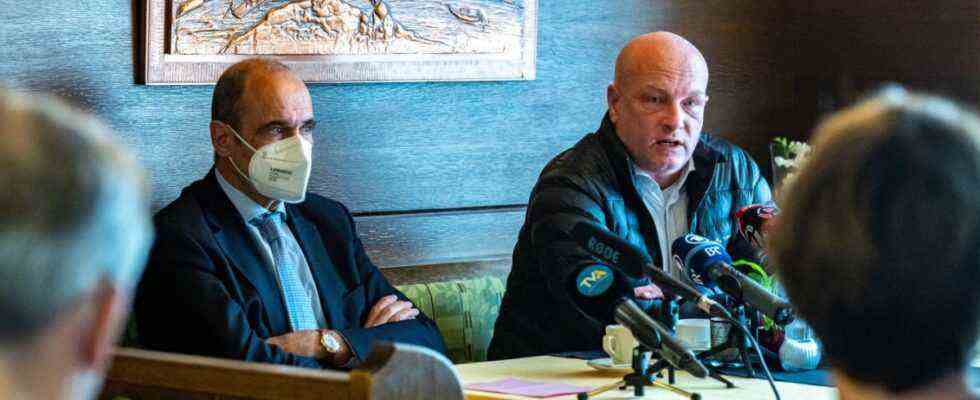It has been more than two months since the Federal Court of Justice in Leipzig confirmed the conviction of the former Mayor of Regensburg, Joachim Wolberg, in 2020 and collected the partial acquittals from his first trial in 2019. Since then, journalists and the public have been waiting for Wolbergs to answer a few questions. How he felt about the negotiations in Leipzig, for example. Or after the consequences he will draw, since he has been convicted.
Wolbergs has now partially answered these questions. In front of a wood-panelled wall in a small hotel near Regensburg’s main train station, with his lawyer Peter Witting at his side. You have invited to a press conference to provide information on the current state of affairs. Behind the two is a copper engraving of Regensburg, the city that was Wolbergs’ city until his arrest almost exactly five years ago and which he once said he would leave if he was convicted. That’s how it happened, but Wolbergs is still there and doesn’t want to let the BGH judgment sit on it.
Wolbergs and his defense attorney have filed a constitutional complaint with the Federal Constitutional Court in Karlsruhe. On the one hand, fundamental questions of party financing and the associated admissibility of party donations are to be clarified. Lawyer Witting raises the question of “how a top municipal candidate can still accept donations” without making himself suspicious or liable to prosecution. This question is also of nationwide importance, says Witting.
On the other hand, Witting wants the Federal Constitutional Court to check whether the second trial against Wolbergs, in which he was sentenced to a suspended sentence by the Regensburg district court for bribery in 2020, was based on the constitutionally enshrined principle of guilt. “No punishment without guilt, it says. So the question is, has guilt been properly established? We say very clearly: No!” Wittings and Wolbergs’ criticism is primarily aimed at the relevant criminal division of the Regensburg district court. In its verdict, this deviated from the findings from the taking of evidence, said Witting. And immediately pushed himself afterwards that this was a “serious allegation”. “The chamber painted a picture that has nothing in common with the actual story.” The BGH did not correct this omission and failed as a supervisory authority, Witting continued. “It was a farce,” he said. You imagined the whole thing differently. “We presented our arguments, but there was no discussion among the participants in the proceedings afterwards, and we weren’t asked any questions.” After hours of statements and explanations by the prosecutor and defense attorneys, the judges withdrew on the evening of that November day – and presented their verdict, including a press release, 45 minutes later.
From the point of view of Witting and Wolbergs, however, not because the case is clear and Wolbergs’ offenses have been proven. But because the BGH had no interest in the arguments of the defense. “It was purely a show event,” said Wolbergs about the negotiations in Leipzig.
Wolbergs had to answer twice before the Regensburg regional court on charges of bribery. It was about donations from contractors to the Regensburg SPD local association Stadtsouth, i.e. to the election campaign account of the then mayor candidate Wolbergs. The donations, a total of almost half a million euros, flowed to the local association through straw people over the years, always in tranches of just under 10,000 euros, the publication limit for party donations.
The Regensburg district court saw it as proven that the property developers bought the favor of the mayor candidate. In both cases, Wolbergs was convicted of bribery, but only in one case did the former mayor receive a sentence, namely a year’s imprisonment on probation. The BGH confirmed this judgment in November. In the first trial, on the other hand, Wolbergs went unpunished despite his conviction, on the grounds that he had not knowingly acted criminally and had already been punished enough. The BGH decided that the verdict was too mild and referred the case to an economic criminal chamber of the Munich I Regional Court. There must be a new hearing. And what’s next for the Wolbergs outside of courtrooms, as a Regensburg city councilor, for example? “I don’t know yet. I’m not ready to take the consequences I announced earlier.” He probably means the announcement that he will leave Regensburg if he is convicted, also politically. Although he has lost almost everything, he still wants to fight for his honor.

